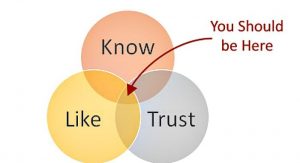 As a long-standing member and former Director Consultant for BNI, I have learned that people are more likely to do business with people who they know, like, and trust. Think about life 20-30 years ago. Our parents and grandparents would buy, sell, and barter with neighbors and friends. They knew each other, their families, and their reputations–good or bad. In today’s tech world, it’s similar. If the business has a good reputation, such as Amazon, we feel like we can trust them with our credit card and personal information. There are plenty of sites on the internet that do not deserve our trust!
As a long-standing member and former Director Consultant for BNI, I have learned that people are more likely to do business with people who they know, like, and trust. Think about life 20-30 years ago. Our parents and grandparents would buy, sell, and barter with neighbors and friends. They knew each other, their families, and their reputations–good or bad. In today’s tech world, it’s similar. If the business has a good reputation, such as Amazon, we feel like we can trust them with our credit card and personal information. There are plenty of sites on the internet that do not deserve our trust!
TIP: Focus on building relationships first. Strong relationships often lead to affiliate marketing success due to the “know, like, trust principle.”
When I pass a referral for a colleague in BNI, I am placing my reputation on the line with the recipient of that referral, so I’d better be sure that I am confident of my referral partner’s abilities and professionalism! This is how you should determine which affiliate programs to promote. If you don’t believe in the product or the person selling it, walk away; the money that you earn won’t be worth the damage to your reputation.
At this time, I would like to invite you to get to know me a little! Please sign up for my newsletter. The welcome email tells you all about me and my business ventures, how I got started and where I’m headed. I’d love to hear your story, too! Please feel free to comment or send me an email!

 Marketing on a daily basis is a very important aspect of building, growing, and maintaining a successful business. While you may have favorite strategies and techniques, it’s a good idea to use a variety of marketing methods. The 365 marketing tips I will share with you in 2018 can help you broaden your scope and reach more of your target market.
Marketing on a daily basis is a very important aspect of building, growing, and maintaining a successful business. While you may have favorite strategies and techniques, it’s a good idea to use a variety of marketing methods. The 365 marketing tips I will share with you in 2018 can help you broaden your scope and reach more of your target market. Starting on January 1 – One marketing tip each day. Just a bite-sized nugget to encourage you to market your business. Not every tip will apply to everyone, but hopefully everyone will learn new ways to improve their marketing! I always welcome feedback and questions!
Starting on January 1 – One marketing tip each day. Just a bite-sized nugget to encourage you to market your business. Not every tip will apply to everyone, but hopefully everyone will learn new ways to improve their marketing! I always welcome feedback and questions! Right out of the box, WordPress is a wonderful blogging software, which is how it got its start. However, it has developed over the years to become a complete CMS (Content Management System)–and a hearty one, at that! So, without adding anything to WordPress, you can create a fully functional website, including a blog…or not. At this point, I’ll just add a little explanation. The term “website” generally refers to static information, although from a SEO (Search Engine Optimization) perspective, you are best to make frequent changes. The term “blog” or in the early days, “web log”, generally refers to a frequently updated web page, listing most recently posted articles first and working backwards, chronologically. Having a blog on your website will maximize your points with Google and other search engines, thus, helping your site to rank higher in search engines results.
Right out of the box, WordPress is a wonderful blogging software, which is how it got its start. However, it has developed over the years to become a complete CMS (Content Management System)–and a hearty one, at that! So, without adding anything to WordPress, you can create a fully functional website, including a blog…or not. At this point, I’ll just add a little explanation. The term “website” generally refers to static information, although from a SEO (Search Engine Optimization) perspective, you are best to make frequent changes. The term “blog” or in the early days, “web log”, generally refers to a frequently updated web page, listing most recently posted articles first and working backwards, chronologically. Having a blog on your website will maximize your points with Google and other search engines, thus, helping your site to rank higher in search engines results.